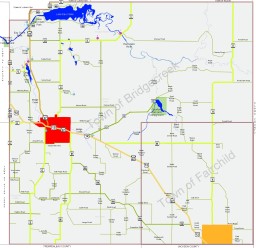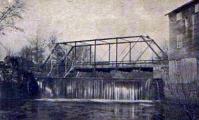Augusta Wisconsin History for the Town of Bridgecreek
A Detailed Area History of the Town of Bridge Creek
[ See the Detailed Map of the Bridgecreek Township in Eau Claire County ]
The History of Bridge Creek Township, Eau Claire Co., WI reproduced with permission
In the early days ere history was written, the water of Bridge creek babbled on to the sea. It is not even written how long it had babbled when men and women came to make the country through which it flowed fit for their habitation. Geologists have told us that it marks the southern extremity of the vast area of that first formation that arose out of the chaos of the waters that covered the earth ere the sun or the moon obeyed the creative behest: "Let there be light." But whatever the geologists may tell us, or whatever the philosophers may reveal unto us is not of particular interest to us just now, and was of much less interest to those sturdy pioneers who came to establish a civilization and realize the fruition of a bountiful promise.
When Eau Claire county was organized by an act of the legislature in 1856, there were but few settlers in the eastern part thereof. Probably the first settler was Andrew Thompson, who came, it is said, in 1854, and settled and built a house on what was later Henry Brown's pasture in Otter creek. The valley was named Thompson valley. If he came in 1854, he was here at least a year, perhaps more, before the coming of others. In 1856 when the county was organized, Charles Hale, L. D. McCauley and J. A. Bride had settled in what has since been known as Scott's valley; Lorenzo and William Bennett and Charles and Scribner Chadbourne had located in Thompson valley; George Diamond had settled on the Diamond farm in Diamond valley, and a little bunch of pioneers, James Woodbury, E. L. Hull, William Young and perhaps a few more, had settled near where the village of Augusta was soon to be. These, together with the first settlers in Augusta, Charles Buckman, S. E. Bills, John F. Stone and a few more, constituted at that time the population of the town of Bridge Creek.
When Eau Claire county was organized there was quite a settlement at Eau Claire, and the act of the legislature which created the county provided that the government of the county should be vested in the town board until the next annual town meeting. The county was divided into the towns of Half Moon, Brunswick and Bridge Creek. The town of Bridge Creek comprised nearly all the east half of the county, or, to be more particular, what is now the towns of Fairchild, Bridge Creek, Ludington, Otter Creek and Clear Creek. Augusta Wisconsin
The first town meeting was held at the house of William Young, just east of the schoolhouse on Main street, Augusta. The date of the town meeting was April 7, 1857. The officers elected were as follows:
Supervisors, William Young, chairman; L. Bennett and Joseph Sargent, sideboard. Clerk, J. C. Hackett. Treasurer, James McCauley. Assessor, Charles Buckman. Justices, L. M. Underwood, J. F. Stone, S. E. Bills and R. E. Scott. Constables, William Buck, Anas Brown and W. A. Bennett. Sealer of weights and measures, John A. Bride.
The voters adopted a resolution to appropriate the sum of $150.00 for
roads and bridges, and $150.00 for schools. A resolution was also
adopted providing that "hogs shall not be allowed to run at large, or
that hogs shall not be considered free commoners." It was ordered that
notices of the adoption of this resolution be "duly posted according to
law." The four justices of the peace elected "drew lots" for the
one-year and two-year terms, and Messrs. Stone and
 Underwood
got the long term and Messrs. Scott and Bills had to take the short
term. And so the town of Bridge Creek was organized and officered. It
was a big town and but sparsely settled. What is now the town of
Ludington was an unsettled wilderness; the three eastern townships were
little better. The southeast portion of the town was a rolling country
of a rich sandy loam soil and covered with a low growth of oak. It was
well watered and has since developed into the finest farm country in the
Northwest. The heavy pine that covered the timbered portion of the town,
and much of the hardwood, has since been cut off and many good lands
have been opened. There is still much good land, however, that has not
been broken and there is yet room for many more good farms.
Underwood
got the long term and Messrs. Scott and Bills had to take the short
term. And so the town of Bridge Creek was organized and officered. It
was a big town and but sparsely settled. What is now the town of
Ludington was an unsettled wilderness; the three eastern townships were
little better. The southeast portion of the town was a rolling country
of a rich sandy loam soil and covered with a low growth of oak. It was
well watered and has since developed into the finest farm country in the
Northwest. The heavy pine that covered the timbered portion of the town,
and much of the hardwood, has since been cut off and many good lands
have been opened. There is still much good land, however, that has not
been broken and there is yet room for many more good farms.
The second annual town meeting was held April 6, 1858. J. E. Perkins was elected chairman of the town board, and Josephus Livermore and James Sargent, supervisors. J. C. Hackett was elected clerk, L. Bennett, treasurer, and Charles Buckman, assessor. The sum of $400 was voted for incidental expenses; $100 for roads and bridges, and $200 for schools. A resolution was adopted to prevent the running at large of calves under one year old, and also geese; the former under a penalty of 50 cents for the first offense and $1.00 for every subsequent offense. The penalty for geese was 25 cents for the first offense, and 50 cents for all subsequent offenses. It was also discovered that the resolution of 1857 relating to hogs was without a penalty clause, and the matter was remedied by making the penalty $5.00 for the first offense and $10.00 for offenses thereafter. These resolutions were "posted according to law."
July 4, 1857, the first fourth of July celebration in the town was held at the farm of Simon Randall. He had bought the William Young place and the people gathered there and had a regular old-fashioned good time. In the evening they had a dance and Alfred Bolton played the fiddle. Allen Randall was a little fellow at that time, five years old, and he had a regular Buster Brown of a time. That celebration and that dance were the first events in the social life of Augusta and Bridge Creek, and for years thereafter the spirit of fellowship and good will grew and the social life was of that wholesome kind, unmarred by class distinctions that prevails when the people live near to Nature's heart. There was no fol-de-rol, no nonsensical tommy-rot, nor any of that superior culture that marks the upper stratum of the modern social life. The people were hearty in those days, good-souled, and between the hours of toil had sense enough to have a good time.
At the town meeting in the spring of 1859 the old officers were all re-elected, and the town records do not disclose that anything of special interest was done.
The town meeting in 1860 resulted in the election of Harris Searl as chair- man and Josephus Livermore and Charles Hale as supervisors; C. W. Warren was elected clerk, J. C. Smith, treasurer, and Charles Buckman, assessor. Mr. Smith refused to qualify as treasurer and the board appointed Charles Buckman in his place and then appointed J. C. Hackett as assessor, the office to which Mr. Buckman had been elected. The bond of Mr. Buckman as treasurer was $3,200. The first bills audited by the town board that are of record were those of J. C. Hackett for clerk, salary $32.33, and H. C. Putnam for surveying, $3.50. These claims were audited and paid in June, 1860. At the town meeting that year R. E. Scott made a motion that a committee be appointed to investigate the doings of the town officers since its organization. There is no record that the committee ever made a report. The total amount of claims paid and town orders issued was $672.60. The accounts were audited and the orders cancelled by the board of audit March 26, 1861. The record also discloses the fact that William Young was elected superintendent of schools at the town meeting in 1860. Just what his duties were the writer does not understand, but they were probably similar to those of the county superintendent of schools at the present time.
In 1861 the old board was re-elected with William Maas as clerk, Charles Buckman, treasurer, and J. C. Smith and S. W. Crockett as assessors. The town was too big for one assessor, and so they elected two. Both of the assessors refused to qualify, however, and C. W. Chadbourne and J. M. Woodbury were appointed in their stead. The total amount of orders drawn for incidental expenses that year was $481.94.
The result of the election in 1862 was the choice of Josephus Livermore as chairman, C. H. Hale and Orrin C. Hall, supervisors; Harris Searl, clerk, Charles Buckman, treasurer, and R. E. Scott, assessor. A committee consisting of Messrs. F. Dighton, Peter Lundeville and William Young was appointed by the voters at the town meeting to look into certain doings of the town board. The committee made the investigation during the day, and before the meeting adjourned brought in two reports. The majority report was by Messrs. Dighton and Lundeville in effect that the board had an undoubted right to purchase a map. Mr. Young made the minority report which declare that $25.00 for a map is unnecessary in these times of high taxes. The majority report was adopted by the electors. The total vote polled at the election was 75. A tax of five mills was levied for highway purposes.
The war was on and the country was calling for brave men to come to the front and offer their lives upon the altar of their country. The call was not unheeded, even among the little band of pioneers of Bridge Creek. On September 5 Supervisor Hale and Treasurer Buckman resigned their offices to take up arms in defense of liberty, and Messrs. James Sargent and H. Blair were appointed to the respective positions. On September 19 Orrin C. Hall resigned as supervisor and Daniel Russell was appointed in his stead. He went to the war and never returned. J. L. Ball also resigned as justice of the peace, and M. B. Rickard was chosen at a special election to take his place. Thus the town of Bridge Creek was organized, and had already assumed an importance as an economic, political factor in the history of northern Wisconsin. In fact, when Governor Barstow, in 1856, wanted a few hundred votes to re-elect him, they were forthcoming from Bridge Creek, even though there were not twenty-five people in the town. The game worked for a short time, but the courts took the matter in hand and Barstow gave up the executive office in compliance with the judicial determination.
These were strenuous years in Bridge Creek. The flower of the young manhood went to the war; the country was new and taxes were high. On March 3, 1864, a special town meeting was called to vote upon a proposition to raise $5,000 to pay bounties to the volunteers and men drafted to fill the quota called for by President Lincoln. There were 50 votes cast on the proposition, all in the affirmative. A resolution was passed directing the clerk to draw orders on the fund as the claims were allowed. Another special town meeting was held and $4,000 was appropriated for the same purpose. There were 48 votes cast, of which 47 were for the appropriation and 1 against. February 25, 1865, another special meeting voted $1,000, and March 25 $2,000 more was voted. These various funds were largely made up by personal subscriptions, thus avoiding the necessity of a tax levy. To raise so large a sum of money, $12,000, among a people where 50 votes was the entire voting population, was a task of no mean proportions, but it was done and out of the effort the people came forth unscorched by the fires of distress and ready to bear still greater burdens.
In 1867 the town of Otter Creek was organized and set off from Bridge Creek. It comprised what is now the towns of Otter Creek and Clear Creek. In the division of the town funds after all debts had been paid Otter Creek had $232.94, and Bridge Creek had $412.18.
Meanwhile the village of Augusta had grown, and there were those who
had an idea that there should be provided places where booze might be
purchased. In conformity with this idea G. J. Hardy made application to
the town board. The application was favorably acted upon and the license
to sell spirituous and malt liquors was granted. The license fee was
fixed at $75.00. Soon thereafter Ren Halstead and H. S. Baldwin were
granted a license for the same purpose at the same time. Later it was
discovered that the license fee as fixed by the town board was
excessive, and it was reduced to $20. In 1870 the fee was again raised
to $75.00. In 1873, June 24, a special town meeting was called to vote
$2,500 to build a bridge across the Eau Claire river where the main river bridge now is. The proposition was defeated by a vote of 66
to 16. This was about the voting strength of the town at that time. In
1877 the towns of Ludington and Fairchild were organized and set off
from Bridge Creek. The village of Augusta was organized and set off in
1883. This left Bridge Creek with less than three townships.
main river bridge now is. The proposition was defeated by a vote of 66
to 16. This was about the voting strength of the town at that time. In
1877 the towns of Ludington and Fairchild were organized and set off
from Bridge Creek. The village of Augusta was organized and set off in
1883. This left Bridge Creek with less than three townships.
[This photo was once incorrectly identified as The Stone Street Mill, Dam and Bridge over Bridge Creek in Augusta Wisconsin. Further research indicates it is the Bills Street Mill Dam and Bridge over Bridgecreek, seen here. You can see a large photo of it on the Bills Street Bridge page - The location is now the Grace-Marquardt Park, seen here ]
In the early days nearly all of the northern and eastern portions of
the town were covered by forests and these were watered by numerous
small streams, tributaries to the Eau Claire river. Game and fish
abounded and the territory was the paradise of the hunter and the
fisherman. The southern and western portions of the town as it
originally was an as it is now presents a prospect that to the
agriculturist is a dream of pure delight.
The original population was mostly of Yankee descent, but since the war
the Germans have come, and with their industry and persistence have
practically possessed the land. Dairying and diversified farming is the
principal occupation of the people, who are earnest, honest and
industrious, and nowhere in the world can be found a more patriotic
people.
================================================================
USGENWEB NOTICE: In keeping with our policy of providing free information on the Internet, data may be used by non-commercial entities, as long as this message remains on all copied material. These electronic pages may NOT be reproduced in any format for profit or for presentation by other persons or organizations.
Persons or organizations desiring to use this material for purposes other than stated above must obtain the written consent of the file contributor, or the legal representative of the contributor, and contact the listed USGenWeb archivist with proof of this consent. The submitter has given permission to the file permanently for free access.
This history was contributed for use in the Augusta Wisconsin Web by: Nance Sampson nsampson at spacestar.net April 15, 2000

